Daniel Deronda By George Eliot
Daniel Deronda By George Eliot Price comparison



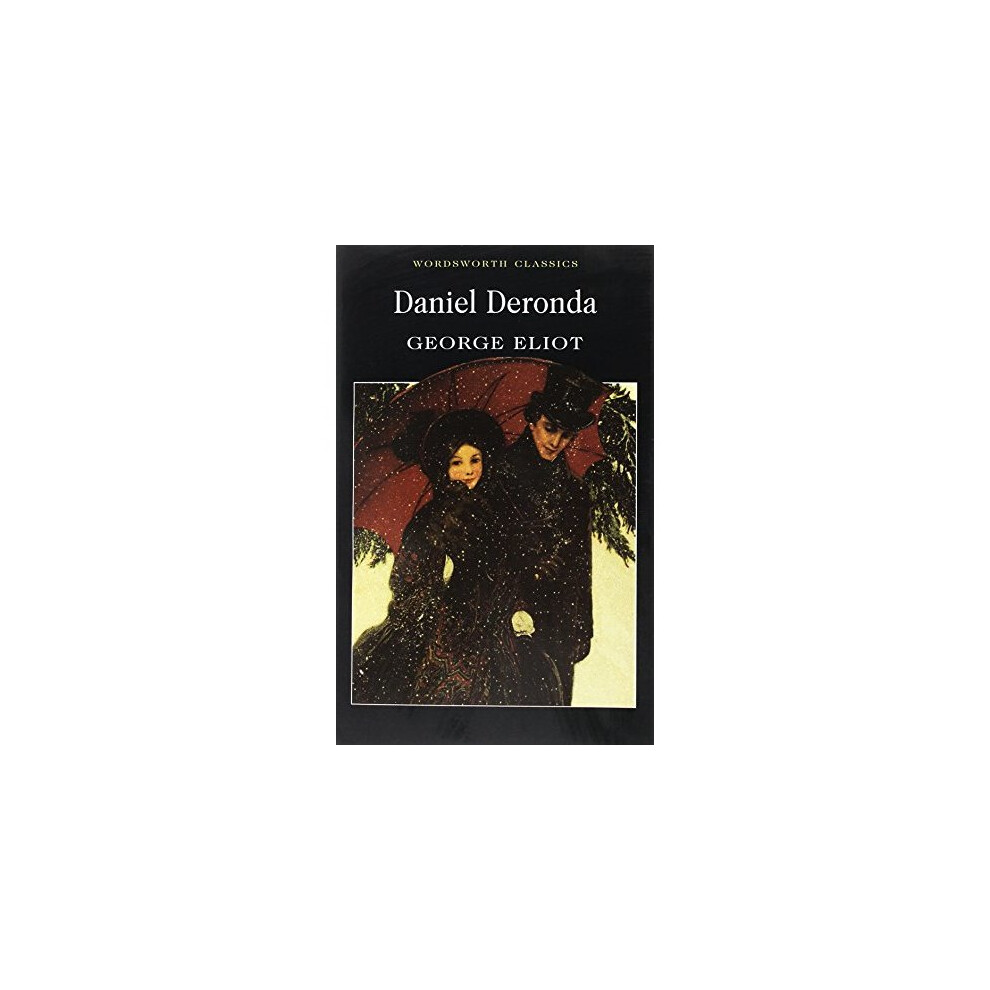





- All prices mentioned above are in United States dollar.
- This product is available at Rakuten Kobo US, OnBuy.com, Lovereading.co.uk, Waterstones.com, Whsmith.co.uk, Cazaar.co.uk, SpringerLink Shop INT.
- At kobo.com you can purchase Daniel Deronda for only $0.99 , which is 99% less than the cost in Whsmith.co.uk ($122.67).
- The lowest price of Outlook Verlag Daniel Deronda was obtained on October 18, 2025 13:35.
Daniel Deronda By George Eliot Price History
Daniel Deronda By George Eliot Description
Discover “Daniel Deronda” by George Eliot: A Literary Classic
“Daniel Deronda” is a timeless novel by acclaimed author George Eliot, originally published in 1876. This captivating tale weaves together the lives of its characters, exploring themes of identity, love, and moral questions. As one of the most significant works in English literature, owning a copy of “Daniel Deronda” is a must for any literature enthusiast.
Key Features and Benefits of “Daniel Deronda”
- First Edition Publication: Released in 1876 by Harper & Bros, this first edition hardcover ensures authenticity and historical significance for collectors.
- Comprehensive Length: Spanning 1491 pages, this novel offers in-depth exploration and development of complex characters and themes.
- Durable Hardcover Format: The sturdy hardcover binding provides longevity, making it an excellent addition to your personal library.
- ISBN and Specifications: With a unique ISBN-10 (1135445796) and ISBN-13 (978-1135445799), finding this classic in the digital marketplace is effortless.
- Weight: Weighing only 1 pound, this hardcover book is easy to handle and transport, ideal for reading at home or on the go.
Price Comparison Across Suppliers
When searching for “Daniel Deronda” by George Eliot, price varies among different suppliers. As of the latest data, prices range from competitive rates for new copies to budget-friendly options for used editions. Our comprehensive price comparison tool helps you find the best deals available across various online retailers.
Analyzing the 6-Month Price History
Over the past six months, the price trends for “Daniel Deronda” have shown fluctuations. Initial listings were higher, likely reflecting a surge in demand among literary collectors and scholars. Recently, however, there has been a slight dip in pricing, potentially linked to renewed interest in Eliot’s works amid literary discussions and academic courses. This information can help you assess the best time to purchase this classic novel.
What Readers Are Saying: Customer Reviews
Customer reviews of “Daniel Deronda” highlight both its literary brilliance and some challenges readers encounter. Many rave about Eliot’s intricate character development and philosophical depth, stating that the novel invites profound reflection on personal and societal issues. On the downside, a few readers mention the pacing can be slow at times, with complex narratives that require patience. Overall, the majority express that the rewarding experience outweighs any meandering plot points.
Explore Unboxing and Review Videos
If you want to delve deeper into “Daniel Deronda,” consider checking out related YouTube review or unboxing videos. These resources provide visual insights into the book’s presentation and cover discussions about its themes and narratives. Engaging with these videos can enhance your understanding of George Eliot’s intent and style.
Why You Should Own “Daniel Deronda”
“Daniel Deronda” not only enriches your literary collection but also serves as a vital piece of cultural history. George Eliot’s exploration of identity and morality resonates with contemporary readers, making it a relevant read for all. Whether you are a devoted fan of Eliot or someone exploring classic literature, this book offers a multi-layered reading experience that invites discussion and reflection.
Don’t miss the opportunity to own this remarkable work. Our platform allows you to compare prices and find the best deals for “Daniel Deronda” effortlessly. Gather insights from detailed customer reviews and benefit from price history, ensuring that your purchase decision is informed and beneficial.
Compare prices now!
Daniel Deronda By George Eliot Specification
Specification: Daniel Deronda By George Eliot
|
Daniel Deronda By George Eliot Reviews (8)
8 reviews for Daniel Deronda By George Eliot
Only logged in customers who have purchased this product may leave a review.

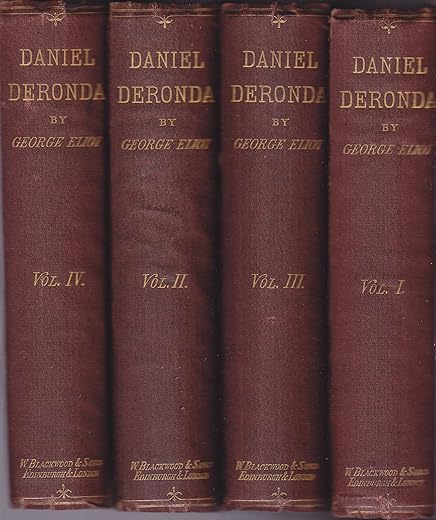
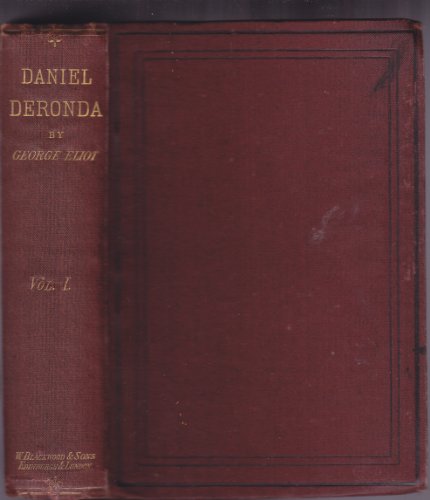
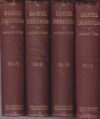
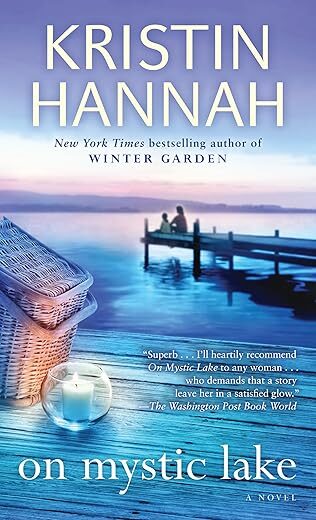
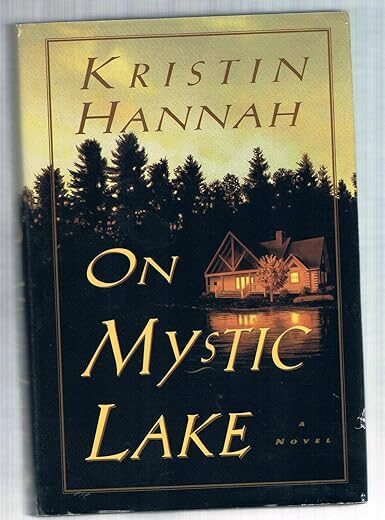
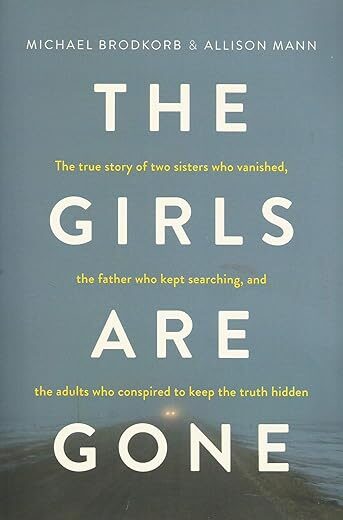
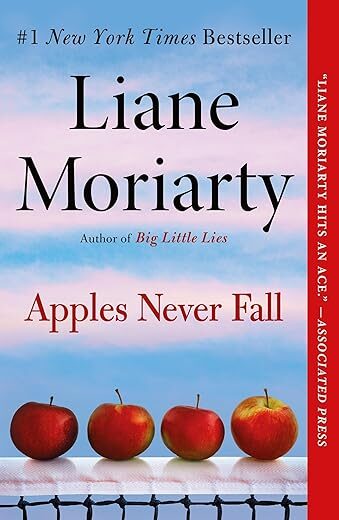
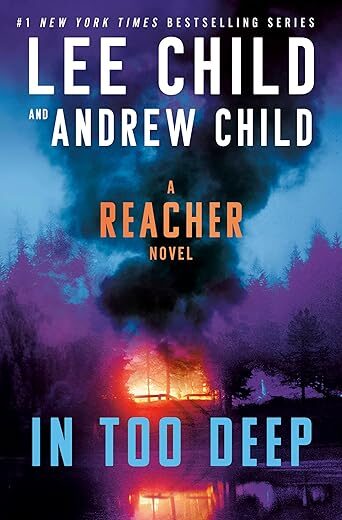

Judith –
AOK
Jean Romano –
One human and very flawed young woman and one who can only be described as a paragon of all goodness. And, of course, Daniel chose the good woman to lead him into the future quest. I am glad of his goals but he might have been doubly appreciated had he chosen Gwen.
Mary Whipple –
In what may be her most exciting and original novel, George Eliot weaves two completely different plots, one of which is a uniquely sympathetic and fully developed story with Jewish protagonists. Presenting no Jewish stereotypes, as we see in Dickens (in Oliver Twist and other novels) and even Trollope (with The Way We Live Now (Barnes & Noble Classics)), she depicts characters who have, in one case, tried to avoid their heritage and in another have been drawn irrevocably to a religion and culture with which they have had no previous contact.
Daniel Deronda, a young man who has been brought up as an English gentleman by Sir Hugo Mallinger, has never known his real parents, secretly fearing that he is illegitimate. As time passes, he longs to understand the circumstances of his birth, especially after Sir Hugo marries and produces heirs of his own. Beautiful Gwendolen Harleth, selfish and manipulative, is romantically attracted to Daniel, but a sudden change in her family’s financial status leads her into a precipitous but financially advantageous marriage to the arrogant Henleigh Grandcourt. Meanwhile, Daniel saves a young woman from drowning herself, a singer named Mirah Lapidoth who is in despair. Mirah, a Jew, has been stolen from her family by her father, whom she suspects planned to sell her into white slavery, and she desperately misses her mother and brother, whom she can no longer find. As she progresses with her singing career, she never forgets her heritage, of which she is inordinately proud.
As Eliot develops the various social settings of this fascinating novel, written in 1876, a full picture of British society evolves. To protect Mirah from her father and her own despair, Daniel places her in the home of friends and resolves to try to find her family. When Daniel discovers her brother Mordecai, a Jewish mystic and seer, Mordecai is convinced, against all odds, that Daniel is Jewish–and is the person who will carry his visions for a Jewish nation to fruition. As the novel develops further, Eliot explores Jewish mysticism, religious traditions, and cultural heritage, even as she also uses the shallow, aristocratic life of Gwendolen Harleth Grandcourt as a contrast to that of Mirah.
The novel is unique in its favorable and lengthy depiction of Judaism and in its illustration of Judaism’s cultural superiority to superficial, aristocratic British life. Mirah and her family take center stage in terms of sympathy, despite the fact the Gwendolen, who in other novels might have been the heroine, suffers terribly in her miserable marriage to Grandcourt. Daring to do something completely different with this complex novel, which was her last, Eliot’s vision and seriousness of purpose here created enormous controversy in its time and presaged a new direction for the novel. n Mary Whipple
Middlemarch (Signet Classics)
The Mill on the Floss (Penguin Popular Classics)
Adam Bede (Penguin Classics)
George Eliot: The Last Victorian
Clothes Horse –
A good enough read but, like her fellow novelists of her day, George Eliot uses a lot of words – and your time – to say not a lot.
LitKidz –
This long and at times complicated book is quite remarkable for its subject matter, as it deals with the identity and prejudices about the Jewish people in London in the 1800’s. George Eliot is masterful as usual in creating characters, even hateful ones such as Grandcourt and Gwendolyn, and creates a lovely sympathetic character in a young Jewish brother and sister. Well worth making the effort to read… This edition had no footnotes which is a shame, as there are so many quotes and references that I wish were annotated.
nancy lapidus –
These 710 pages are really two books in one. Don’t read it for a deadline. It’s the sort of book you keep by your bed for about a year and read a few pages every night before going to sleep. I had to read it for a deadline and dreaded about half of it.
One book concerns an attractive, selfish girl-woman with not too clean scruples. I’ll bet Scarlett O’Hara is based on Gwendolen Harleth. Having been careless about her education and talents, she has the bad judgment to marry a rich, sadistic man with nobility prospects. Eliot elucidates the psychological sadism, but as a true Victorian, omits the probable sexual sadism. Daniel Deronda is an embodiment of her conscience and tries to help her through her eventually overwhelming feelings of guilt.
Daniel is also the connection to the so-called other book, which describes the Lapidoth/Cohen family,their hardships in a Gentile world, and their Zionism as a hope for their unity with God. There are mysteries concerning Daniel’s heritage, but the reader can pretty well guess what it is long before it is revealed.
I had mixed feelings about this book. Some of it is delightful, witty in its description of the British gentry and their prejudices of religion and rank. Other parts are ponderous, with 80-word sentences embodying lofty and vague ideals. The Jewish parts are written with good will, but some of the things are wrong and actually a bit patronizing. Example: A boy is named after his living grandfather. Naming is actually done in honor of a person who has died, to further their memory. Victorianly, circumcision is omitted. Nevertheless, the writing is terrific and evoked genuine emotion in me.
Rainy day reader –
‘Daniel Deronda’ is witty, descriptive, and romantic. Before there was Scarlett O’Hara, willful Gwendolyn Harleth schemed to get her way in a society that offered security only to the rich. The author offers fascinating glimpses of mid 1800’s drawing rooms, hunting parties, casinos, and more, filling them with memorable characters. This is a classic English novel, verbose perhaps, but with a clarity that’s lets the reader inhabit another century. For those not familiar with Eliot’s style, narrative and description may seem to set a slow pace.
J. Trent –
She is one of my all-time favorite authors. This is a terrific book by one of the great writers of the 19th century.